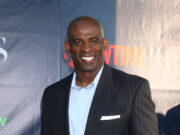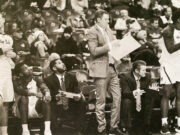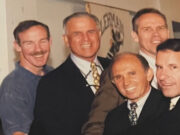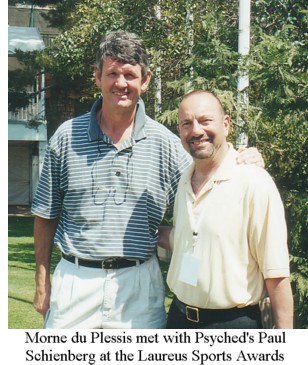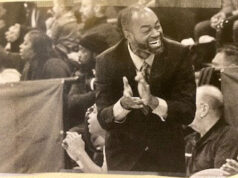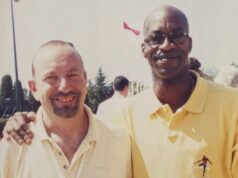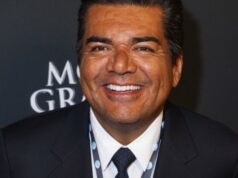With Paul Schienberg, Ph.D.
Morne became one of South Africa’s most successful captains in the history of Rugby and, in 1995, managed the Springbok side that won rugby’s World Cup in Johannesburg in its first attempt. He played for the national team for 10 years, captained it for 5 years and played position number 8. Morne du Plessis is the founder of the Sports Science Institute of South Africa in Cape Town (www.ssisa.com). Also, he is the co-founder of Bioenergetics of Exercise Research Unit of the University of Cape Town and the Medical Research Council headed by Prof. Noakes (ESSM).
Psyched: What sport project is close to your heart today and taking your attention?
Plessis: We started a sports training program in our townships – part of it is a life skills training program. I was interested in being a sports psychologist myself. Our mission is to help people improve their performance in sports and in life.
Psyched: I want to follow up on your program that you are creating in South Africa with young people.
Plessis: I would be glad to send you information about it.
Psyched: Can you tell me about your experience as a Rugby player? What motivated you?
Plessis: It’s a long time ago since I played. My situation as a member of a team sport … I had to learn it all on my own. Every individual has his own drivers. They may be unmentionable sometimes. Sometimes easily mentionable. Sometimes identifiable and sometimes unidentifiable. In my case I was driven to succeed in a very competitive environment – to rise above athletic situations could help me rise above life’s troubling situations and I loved the game. When I saw a ball I wanted to play with it and pass it. Also, I loved to read situations before they happened. I had a drive to get myself out of the ordinary. I had a great family support situations.
Psyched: What were your motivators in keeping the interest in training?
Plessis: In training I always remember focusing on one opponent on the team that I was playing against. Focused on him. If I am running up a hill in training, I focused on him saw, myself running past him. There might be some suggestion that he was better than I was. And I focused during my training to beat him. I visualized beating him. He’s not going to do an extra one now – and if he does – I’m going to do an extra one (a run, a push up).
Psyched: Are there additional mental and physical ideas you have come to believe in regarding performance? Like how to handle anxiety?
Plessis: I am a great bio-rhythm proponent. If I felt down on my game, I would just battle through it knowing I am not on top of it. I used experience and skills to get through it. Sometimes I was anxious. Very rarely. It’s easier in a team sport because you hide in the team’s anxiety. I play golf now. I am more worried playing golf than when I competed in the team sport because I am there by myself.
Psyched: How did you deal emotionally with injuries?
Plessis: I didn’t have many injuries.
Psyched: Was money an important motivator for you in playing your sport?
Plessis: My livelihood was not my sport. My sport was not professional back when I was playing. The sport gave me opportunities to make money in other ways. I did industrial psychology. I run a sports science institute. We have sports psychologists there. I’d like to look at your web site and talk to you afterwards. I will show you our website. I have financial interests in a number of professional rugby teams. We have equity. The professional side of the sport has been put into a private company. We never interfere with the outcome of a match. The economics of a situation is too small to have one team – it wouldn’t work. So we have to make a business of it. We invest in the industry.
Psyched: Do you get involved in choosing players for the teams?
Plessis: Choosing personnel. I was the manager of the rugby world cup team. In 1995 we won the world cup. The reason we won the World Cup is that we put the right family of players together. A sports team is a family. There is no text book solution.

